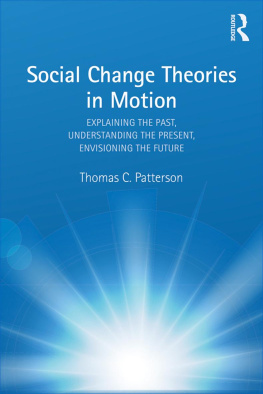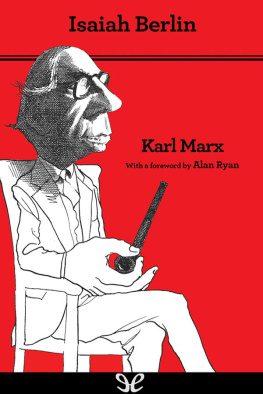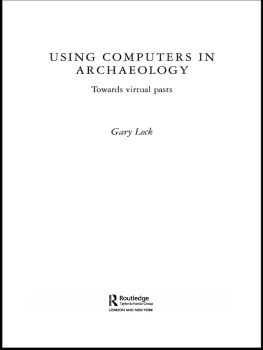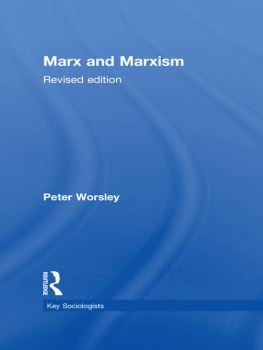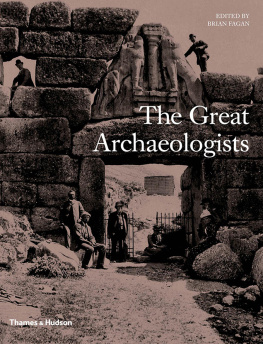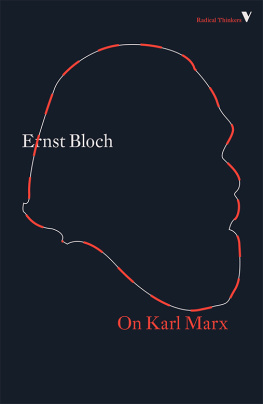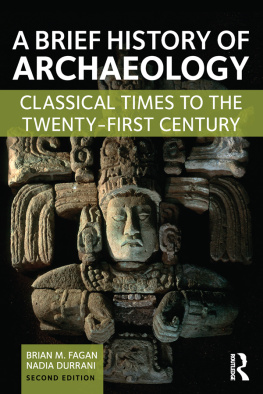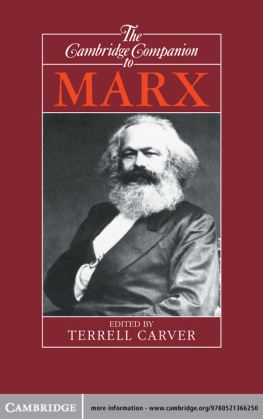First published 2003 by Berg Publishers
Published 2020 by Routledge
2 Park Square, Milton Park, Abingdon, Oxon OX14 4RN
605 Third Avenue, New York, NY 10017
Routledge is an imprint of the Taylor & Francis Group, an informa business
Thomas C. Patterson 2003
All rights reserved. No part of this book may be reprinted or reproduced or utilised in any form or by any electronic, mechanical, or other means, now known or hereafter invented, including photocopying and recording, or in any information storage or retrieval system, without permission in writing from the publishers.
Notice:
Product or corporate names may be trademarks or registered trademarks, and are used only for identification and explanation without intent to infringe.
Library of Congress Cataloguing-in-Publication Data
A catalog record for this book is available from the Library of Congress.
British Library Cataloguing-in-Publication Data
Patterson, Thomas Carl.
Marxs ghost : conversations with archaeologists/ Thomas C. Patterson.
p. cm.
Includes bibliographical references and index.
ISBN 1-85973-701-3 (Cloth) ISBN 1-85973-706-4 (Paper) 1. Marxian
archaeology 2. ArchaeologyPhilosophy. I. Title.
CC75.7.P39 2003
930.101-dc21
2003010059
Typeset by JS Typesetting Ltd, Wellingborough, Northants.
ISBN 13: 978-1-8597-3701-9 (hbk)
ISBN 13: 978-1-8597-3706-4 (pbk)
This is not the preface I originally wrote for Marxs Ghost. Kathryn Earle (my editor at Berg), Bob Preucel (the originally anonymous outside reviewer of the manuscript), Wendy Ashmore (my partner and colleague), Karen Spalding (my friend and frequent co-conspirator during the last forty years), and Carlos Vlez-Ibez (my friend and colleague), among others, urged me write something more autobiographical, something that described how I came to write the book. It was important, they said, to write something that described my own intellectual and political formation and explained how I came to think the way I do. Reluctantly, I agreed to do so. My reluctance is based partly on a view that autobiographies can be self-serving and partly out of modesty. In some respects, my life has been a series of ah ha! now I understand what they are saying revelations or moments. In other respects, I know that I have changed; fortunately, from my view and those of some people I both cherish and respect, I am no longer the person I was. While some will probably be amused, hopefully others may find this autobiographical account useful.
I was born in Rutland, Vermont, in 1937. My father came from a large rural family on the Gaspe Peninsula in which seasonal wage work was supplemented with farming, fishing, hunting, and woodcutting. My mothers family settled in Montreal after leaving Manchester, England, in the 1890s; her father managed a butchers shop. My parents moved to Maine around 1940, and I spent all but one of the next twelve years in Portland and Waterville. My father worked variously as a traveling salesman, a chief warrant officer in the Coast Guard during the Second World War, and the manager of a fuel oil distributing company. My mother was a seamstress. My parents had fifth-grade educations; in their view, this limited the kinds of jobs they could get. As a result, they valued education for the opportunities it afforded. Like many anglophone Canadians who came to New England for work and eventually got U.S. citizenship, they were lifelong Republicans, wary of big business and labor unions, and apprehensive of communism and the Soviet Union. A phrase I heard often as a child was, Behave or the Bolsheviks will get you. My father had a profound sense of fairness, a sentiment that was absent most of the time in my mothers shopkeeper mentality. I attribute this largely to the differences in their class backgrounds and histories; it was an ongoing source of tension throughout their lives.
My father lost his job in July 1952. After several months of indecision, he bought a trailer, loaded my mother and me in the car, and drove West in search of work. In late November, we settled in Pomona, California. My parents soon found work: my mother as a filing clerk in a machine shop, and my father as an expediter at Lockheed. Since both were closed shops, they reluctantly joined the machinists union in order to work. I came to appreciate the importance of union wages, benefits, and protection a few years later when I began working in a series of non-union jobs, most memorably as a gas station attendant and a draftsman in a guided missile factory owned by General Dynamics.
I enrolled as a sophomore at the towns only public high school, which was a ten-minute walk from the trailer park where we lived. In the school the native-born Anglos, many of whose families were dependent in one way or another on the citrus industry, were becoming a minority as immigrants, mostly from Oklahoma and Mexico, swelled enrollments. At the time, Pomona was undergoing massive social transformation as its rapidly disappearing orange groves were being replaced with equal rapidity by tract homes, shopping malls, and freeways. Even though immigration and new housing developments were transforming the landscape, distinctions between older neighborhoods persisted. The houses and lawns were larger and better maintained north of the tracks; there were more bars and auto-shops and Spanish was heard as often as English on the south side where I lived. The racism and disdain for all but the most mainstream of Protestants were as palpable as they were in New England or in Florida, where I had lived for a year. The slurs were the same, only the ethnicities changed. Later, I learned that, in the 1920s, Pomona was home to one of the largest Ku-Klux-Klan chapters west of the Mississippi River.
In the spring of 1953, when I was fifteen, several of my friends from school and I went to Baja California, Mexico, where we camped for several weeks near a fishing village. We helped the fishermen and their families pull heavy nets onto the beach; in return, they gave us fresh fish and told us about the local fishing industry. In 1955, I enrolled in the newly opened campus of the University of California in Riverside. It was not my first choice, but it was the best of the limited options that were available to me. I majored in the physical sciences, thinking I would graduate and turn a summer job as a draftsman into a career. Fortunately, I discovered after a year or so that I was not particularly interested in either the physical sciences or engineering. I also realized that my job was as mind-numbing as the worst of the blue-collar, assembly-line jobs many of my high-school classmates had taken. The only difference between their jobs and mine was that I wore white shirts with plastic pocket liners. I came to understand why the drafting pool where I worked had one of the highest lost-time accident rates in the plant. Eye injuries were especially prevalent among the draftsmen, who tended to impale themselves with fingers and pencils as they nodded off. They were bored out of their minds by tedious repetition and literally fell asleep while they were drawing pictures of nuts and bolts eight hours a day, five days a week, month after month.
My employment at General Dynamics was terminated in 1958. My boss said it was because of the recession, not because I had complained about losing health benefits or working the night shift. In any event, I wasnt eligible for unemployment benefits. This was also conducive to thinking about what I might do after college. By that time, I needed to fulfill a number of breadth requirements in order to graduate. As a result, I took an introductory anthropology course, not out of any intrinsic interest in the subject but rather because it met at a convenient time. This course, taught by Jack Goins, was the most thought-provoking one I ever took. Other teachers who subsequently helped me hone and refine my interests and skills at UC-Riverside were Bud Winans, and Alex Krieger and Carl Sauer, both of whom were visiting faculty members.


